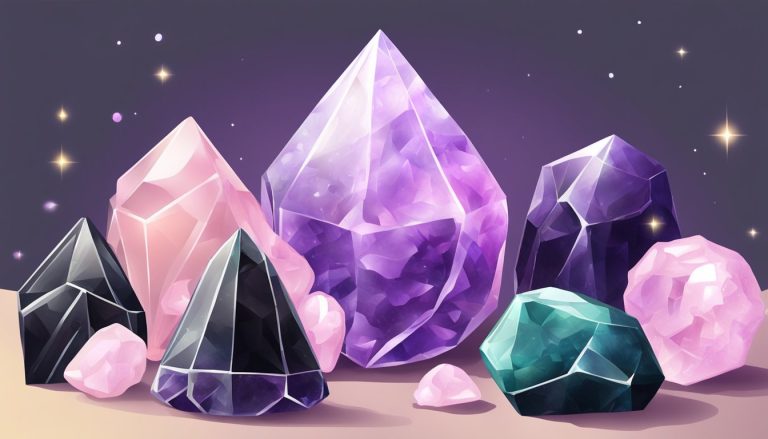What Crystals Cannot Go In Salt? A guide to crystals that are sensitive to salt
Crystals have been used for centuries to promote healing and spiritual growth. They are believed to have unique vibrational energies that can help balance the mind, body, and spirit.
However, not all crystals are compatible with salt, which is a popular method of cleansing and purifying crystals.
In this article, I will discuss what crystals cannot go in salt and why.

Understanding Crystals and Salt Before we dive into the crystals that cannot go in salt, it’s important to understand why salt is used in the first place. Salt is a natural purifier and has been used for centuries to cleanse and purify objects and spaces.
When it comes to crystals, salt is believed to remove any negative energy or vibrations that may have accumulated over time.
Summary
While salt is an effective cleansing method for many crystals, there are some that should be avoided.
Crystals that contain iron or are porous, such as hematite, pyrite, and selenite, should not be cleansed with salt water as they can dissolve or become damaged.
Additionally, any crystal that ends with -ite, such as calcite and apatite, should also be avoided as they can begin to rust when exposed to salt water.
It’s important to research each crystal before cleansing it with salt to ensure that it is compatible.
Key Takeaways
- Salt is a popular method of cleansing and purifying crystals, but not all crystals are compatible with salt.
- Crystals that contain iron or are porous, such as hematite and selenite, should not be cleansed with salt water as they can dissolve or become damaged.
- Any crystal that ends with -ite, such as calcite and apatite, should also be avoided as they can begin to rust when exposed to salt water.
In this article
Understanding Crystals and Salt
Crystals and Their Relationship with Salt
As someone who loves crystals and owns many of them, I understand the importance of taking care of them properly.
One popular method for cleansing crystals is through the use of salt, which can draw out and absorb negative energies.
However, not all crystals can be cleansed with salt. It is important to understand which crystals can and cannot be cleansed with salt to avoid damaging them.
The Mohs Hardness Scale and Crystal Care
The Mohs Hardness Scale is a scale used to measure the hardness of minerals and crystals. It ranges from 1 to 10, with 1 being the softest and 10 being the hardest. Crystals that are 7 or more on the Mohs Hardness Scale are safe to be washed with water or saltwater. Anything lower than 7 is not good.
When it comes to salt cleansing, it is important to keep in mind the Mohs Hardness Scale. Crystals that are too soft can be damaged by salt, while crystals that are too hard can withstand salt cleansing. For example, crystals like rose quartz, selenite, and malachite are too soft and can be damaged by salt. On the other hand, crystals like quartz, amethyst, and citrine are hard enough to withstand salt cleansing.
In conclusion, understanding the relationship between crystals and salt is key to properly caring for your crystals. By keeping in mind the Mohs Hardness Scale, you can ensure that you are using the right method to cleanse your crystals and avoid damaging them.
Crystals to Avoid in Salt
When it comes to using salt to cleanse crystals, it’s important to know which crystals can and cannot be used. While salt can be a powerful tool for cleansing and purifying crystals, it can also damage certain types of crystals. In this section, I’ll discuss the crystals that should be avoided when using salt to cleanse them.
Water-Soluble Crystals
One type of crystal that should be avoided when using salt to cleanse them is water-soluble crystals. These crystals include selenite, halite, and malachite. When exposed to salt, these crystals can dissolve or become damaged. It’s best to use other methods, such as moonlight or sound, to cleanse these types of crystals.
Soft and Porous Crystals
Another type of crystal to avoid in salt are soft and porous crystals. These crystals include calcite, lapis lazuli, and opal. These crystals can be damaged by salt because they are soft and porous, which means that the salt can seep into the crystal and cause damage. It’s best to use other cleansing methods, such as smoke or sound, to cleanse these types of crystals.
Crystals with Metallic Elements
Crystals that contain metallic elements should also be avoided when using salt to cleanse them. These crystals include pyrite, azurite, and gypsum. When exposed to salt, these crystals can become damaged or discoloured. It’s best to avoid using salt to cleanse these types of crystals and instead use other methods, such as moonlight or sound.
In conclusion, it’s important to know which crystals can and cannot be used with salt when cleansing them. Water-soluble crystals, soft and porous crystals, and crystals with metallic elements should be avoided when using salt to cleanse them. By using other methods, such as moonlight or sound, you can safely cleanse and purify your crystals without causing damage.
Alternative Cleansing Methods

When it comes to cleansing crystals, salt is not the only option available. In fact, there are many alternative methods that can be just as effective. Here are a few methods that I personally use and recommend:
Smudging and Smoke Cleansing
Smudging is a Native American tradition that involves burning sage or other herbs to purify a space or object. This method can also be used to cleanse crystals. Simply light a smudge stick and hold your crystal in the smoke for a few minutes, visualising any negative energy being removed. Sage is the most popular herb used for smudging, but other herbs such as rosemary, thyme, and lavender can also be used.
Sound and Vibrational Cleansing
Sound is a powerful tool for cleansing crystals. You can use a singing bowl, tuning fork, or even your own voice to create vibrations that will remove any negative energy from your crystals. Simply hold your crystal near the sound source and allow the vibrations to wash over it. You can also use meditation to create a peaceful environment and visualise the negative energy leaving your crystal.
Light and Earth Cleansing
Exposing your crystals to sunlight or moonlight is another effective cleansing method. Simply place your crystals in a windowsill or outside during the day or night. The energy from the sun and moon will help to remove any negative energy from your crystals. You can also bury your crystals in the earth for a few days to allow them to absorb the grounding energy of the earth.
Overall, there are many alternative methods for cleansing crystals that can be just as effective as using salt. Whether you choose to smudge, use sound, or expose your crystals to light and earth, it’s important to find a method that resonates with you and your crystals.
Frequently Asked Questions

Which stones are not suitable for cleansing in salt?
Not all crystals are compatible with salt cleansing. Any crystal that is porous or has a Mohs hardness rating of less than 7 should not be placed in salt water.
Porous crystals, such as Malachite, Halite, and Azurite, are particularly susceptible to damage from salt water.
Are there any crystals that may be damaged by salt exposure?
Yes, certain crystals can be damaged by salt exposure. Crystals that contain iron, such as Hematite, Pyrite, and Lodestone, may rust or corrode when exposed to salt water.
Additionally, crystals that are sensitive to water, such as Selenite and Kyanite, may dissolve or become cloudy when exposed to salt water.
What precautions should I take when using salt to cleanse my crystals?
It is important to use a non-metallic container when using salt to cleanse your crystals. Metal can react with the salt and damage your crystals.
Additionally, make sure to use purified or distilled water to avoid any impurities that may be present in tap water.
Can you list crystals that should avoid salt water for cleansing purposes?
Some crystals that should avoid salt water for cleansing purposes include Malachite, Halite, Azurite, Hematite, Pyrite, Lodestone, Selenite, and Kyanite.
It is important to research each crystal before attempting to cleanse it with salt water.
How can I safely cleanse crystals that are sensitive to salt?
If you have crystals that are sensitive to salt, you can cleanse them using alternative methods such as smudging with sage or palo santo, placing them in the sun or moonlight, or burying them in the earth for a period of time.
What are alternative methods for purifying crystals that cannot be placed in salt?
Some alternative methods for purifying crystals that cannot be placed in salt include smudging with sage or palo santo, placing them in the sun or moonlight, or burying them in the earth for a period of time.
You can also use sound vibrations or other crystals that are safe for salt cleansing to purify your crystals.




